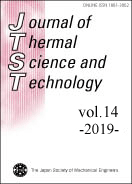
Journal of Thermal Science and Technology
Scope & Guideline
Transforming challenges into solutions in thermal science and technology.
Introduction
Aims and Scopes
- Thermal Energy Systems and Management:
Research on the design, optimization, and performance analysis of thermal energy systems, including renewable energy applications and energy recovery technologies. - Combustion Science and Engineering:
Investigation into combustion processes, including flame dynamics, emissions control, and alternative fuels, with a focus on improving efficiency and reducing environmental impact. - Heat Transfer Mechanisms:
Exploration of various heat transfer phenomena, including conduction, convection, and radiation, in different systems, emphasizing enhancement techniques and experimental validations. - Advanced Materials and Nanotechnology:
Studies on the thermal properties and behaviors of advanced materials, including nanostructured materials, and their implications for thermal management applications. - Thermodynamic Modeling and Simulations:
Development and application of analytical and numerical models for predicting thermal behavior and performance in various engineering contexts.
Trending and Emerging
- Hydrogen and Alternative Fuels:
A significant increase in research on hydrogen as a fuel and its implications for combustion processes indicates a shift towards cleaner energy sources and technologies. - Advanced Computational Modeling:
The rise in sophisticated computational techniques, including machine learning and molecular dynamics simulations, signifies a trend towards more precise predictive modeling in thermal science. - Thermal Management in Electronics and Microdevices:
Emerging studies focus on innovative thermal management solutions for electronic devices, driven by the need for efficient heat dissipation in compact designs. - Sustainable Biomass and Waste-to-Energy Processes:
There is a growing emphasis on biomass energy conversion and waste management technologies, reflecting global sustainability goals and the quest for renewable energy sources. - Nanotechnology in Thermal Applications:
Research exploring the role of nanomaterials in enhancing thermal performance and efficiency in various applications is gaining traction, showcasing the intersection of nanotechnology and thermal science.
Declining or Waning
- Traditional Fossil Fuel Combustion Research:
While combustion studies continue, there is a noticeable decline in research focusing solely on traditional fossil fuels, as the field pivots towards cleaner alternatives and sustainable energy solutions. - Basic Heat Transfer Studies without Advanced Techniques:
Research papers that explore fundamental heat transfer principles without incorporating advanced modeling or experimental techniques are becoming less common, reflecting a trend towards more complex analyses. - Low-Temperature Thermal Processes:
Investigations into low-temperature thermal processes have diminished, possibly due to the increased focus on high-temperature applications and energy efficiency improvements.
Similar Journals
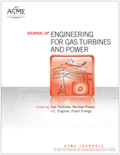
JOURNAL OF ENGINEERING FOR GAS TURBINES AND POWER-TRANSACTIONS OF THE ASME
Exploring Breakthroughs in Energy and AerospaceJournal of Engineering for Gas Turbines and Power - Transactions of the ASME, published by the esteemed American Society of Mechanical Engineers (ASME), is a leading interdisciplinary journal dedicated to advancing the fields of energy engineering, aerospace, nuclear energy, and mechanical engineering. With an impressive history dating back to 1960 and continuing its contributions through 2024, this journal boasts a Q2 ranking in multiple engineering categories, reflecting its strong impact on both academia and industry. Although not an open-access journal, it provides invaluable insights and research findings that cater to the needs of professionals, researchers, and students alike. The journal's ISSN is 0742-4795 with an E-ISSN of 1528-8919, ensuring widespread visibility in the global academic community. Indexed in Scopus, it ranks notably within its fields—21st in Nuclear Energy and Engineering and 51st in Aerospace Engineering—underscoring its relevance and contribution to critical technological advancements. Researchers in this domain will find the journal a vital resource for innovative studies, practical applications, and the latest developments related to gas turbines and power generation.
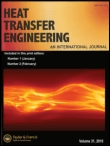
HEAT TRANSFER ENGINEERING
Exploring the frontiers of heat transfer and engineering excellence.HEAT TRANSFER ENGINEERING is a leading international journal published by Taylor & Francis Inc, dedicated to advancing the field of heat transfer and thermal engineering. With a strong focus on the key aspects of Condensed Matter Physics, Fluid Flow and Transfer Processes, and Mechanical Engineering, this journal covers a comprehensive range of topics from experimental studies to theoretical analysis, aiming to foster innovative research and practical applications. Since its inception in 1979 and continuing through 2024, the journal has established itself as an essential resource for researchers and industry professionals alike, reflected in its solid rankings within Scopus—holding a Q2 quartile classification in multiple engineering disciplines. Although not open access, the journal ensures broad accessibility through institutional subscriptions, making cutting-edge research readily available. With its rigorous peer-review process and commitment to quality, HEAT TRANSFER ENGINEERING plays a crucial role in shaping the future of thermal management solutions and engineering practices.

Frontiers in Heat and Mass Transfer
Pioneering Discoveries in Energy DynamicsFrontiers in Heat and Mass Transfer is a premier open-access journal published by TECH SCIENCE PRESS that focuses on the interdisciplinary field of heat and mass transfer. Established in 2010, this journal has been pivotal in disseminating high-quality research aimed at advancing the understanding of energy and material transport phenomena. With an impressive commitment to open access, it ensures that all published articles are readily available to researchers, practitioners, and students globally, promoting knowledge sharing and collaboration. The journal currently holds a Q3 ranking in key categories such as Engineering, Materials Science, and Physics and Astronomy, as well as notable positioning in Scopus rankings. With a forward-looking scope extending from 2010 to 2024, Frontiers in Heat and Mass Transfer continues to be an essential platform for innovative research, fostering the development of practical applications across various scientific and engineering domains. We invite you to explore the latest contributions to this evolving field and consider this journal as a vital resource for your academic and professional growth.
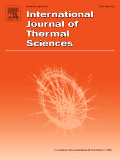
INTERNATIONAL JOURNAL OF THERMAL SCIENCES
Advancing knowledge in thermal sciences.The INTERNATIONAL JOURNAL OF THERMAL SCIENCES is a premier academic journal published by ELSEVIER FRANCE-EDITIONS SCIENTIFIQUES MEDICALES ELSEVIER, focusing on cutting-edge research in the field of thermal sciences. With its ISSN 1290-0729 and E-ISSN 1778-4166, this journal has established itself as a crucial resource for scholars and professionals interested in the thermodynamic principles governing engineering and condensed matter physics. The journal is ranked Q1 in both Condensed Matter Physics and Engineering (miscellaneous), highlighting its exceptional quality and influence, as reflected in its impressive Scopus ranks: #32 out of 307 in General Engineering (89th percentile) and #57 out of 434 in Condensed Matter Physics (86th percentile). Researchers and students alike can benefit from the wealth of articles available, with access options designed to foster a wider dissemination of knowledge within the scientific community. Established in 1973 and ongoing through 2025, the journal invites contributions that advance the understanding of thermal phenomena and their applications, solidifying its importance in driving innovation and insight within these dynamic fields.
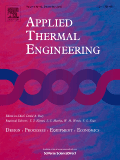
APPLIED THERMAL ENGINEERING
Advancing thermal innovation for a sustainable future.Applied Thermal Engineering is a leading international journal dedicated to the field of thermal engineering, published by Pergamon-Elsevier Science Ltd. With an impressive impact factor indicating its significance in the academic community, this journal focuses on innovative research and developments related to energy engineering, fluid flow, and transfer processes, as well as manufacturing and mechanical engineering. Being indexed in top quartiles (Q1) across multiple categories, it ranks exceptionally well on platforms like Scopus, ensuring that contributors reach a wide and relevant audience. The journal supports both open access and subscription options, promoting the dissemination of vital research findings from 1996 to 2024. With its commitment to advancing the discipline and implementing rigorous peer-review processes, Applied Thermal Engineering serves as an essential resource for researchers, industry professionals, and students aiming to stay abreast of the latest advancements and applied methodologies in thermal science.
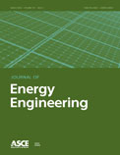
JOURNAL OF ENERGY ENGINEERING
Pioneering Insights for a Greener FutureJOURNAL OF ENERGY ENGINEERING, published by the ASCE-Amer Soc Civil Engineers, serves as a pivotal resource in the fields of civil and structural engineering, energy engineering, and nuclear energy research. With an ISSN of 0733-9402 and an E-ISSN of 1943-7897, this esteemed journal demonstrates a consistent commitment to advancing knowledge in energy systems, sustainability, and waste management. Ranking within the second quartile in several categories—including Civil and Structural Engineering and Energy Engineering and Power Technology—this journal maintains a strong reputation, underscored by its Scopus rankings that place it in the top tiers of its discipline. Accessible from 1982 through 2024, the journal provides researchers and professionals meaningful insights through rigorously peer-reviewed articles, critical reviews, and case studies that address contemporary challenges in energy utilization and infrastructure development. Without open access options, it ensures the integrity and credibility of published work, showcasing influential research that contributes to sustainable solutions in energy and environmental frameworks. Researchers, professionals, and students alike will find the JOURNAL OF ENERGY ENGINEERING an indispensable platform for exploration and dissemination of innovative ideas within the realm of energy and engineering.

FDMP-Fluid Dynamics & Materials Processing
Pioneering Research at the Intersection of Fluids and MaterialsFDMP-Fluid Dynamics & Materials Processing, published by TECH SCIENCE PRESS, stands as a significant contribution to the field of materials science, specifically focusing on the intricate relationships between fluid dynamics and material processing. With an ISSN of 1555-256X and an E-ISSN of 1555-2578, this journal offers an open-access platform where researchers can disseminate their work broadly, promoting collaboration and innovation among professionals and students alike. Established in 2007 and continuously evolving through to 2024, the journal is classified in the Q4 category of materials science, ranking at #347 out of 463 in the Scopus database, signifying its niche yet crucial role in the academic community. By focusing on the dynamic interplay between fluid behavior and material properties, FDMP addresses contemporary challenges and advances in material processing techniques. The journal plays a pivotal role for academics and industry professionals seeking to push the boundaries of knowledge and application in materials science.
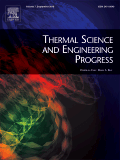
Thermal Science and Engineering Progress
Advancing thermal innovation for a sustainable future.Thermal Science and Engineering Progress is a premier peer-reviewed journal published by ELSEVIER, established to bridge the gap between theoretical and practical advancements within the fields of thermal science and engineering. Since its inception in 2017, this esteemed journal has rapidly ascended to a Q1 ranking in the category of Fluid Flow and Transfer Processes, positioning it among the top 17 of 96 journals in this discipline, as reflected by its impressive 82nd percentile ranking in Scopus. With a focus on disseminating high-impact research, Thermal Science and Engineering Progress aims to foster innovation and collaboration by publishing cutting-edge studies that address both contemporary challenges and future directions in thermal management, energy conversion, and heat transfer technologies. Researchers, professionals, and students alike are invited to explore the wealth of knowledge contained within its pages, which are accessible from its headquarters in Amsterdam, Netherlands. This journal plays a critical role in advancing technological progress and fostering a deeper understanding of thermal processes, making it an essential resource for anyone dedicated to these crucial areas of study.

Acta Mechanica et Automatica
Advancing Mechanical Innovation and Control SystemsActa Mechanica et Automatica is a leading open-access journal published by SCIENDO, dedicated to the dynamic fields of Mechanical Engineering and Control and Systems Engineering. Since its inception in 2012, this journal has provided a vital platform for researchers and professionals to disseminate innovative findings and advances within these disciplines, boasting a convergence of years up to 2024. Based in Warsaw, Poland, the journal has embraced open access since 2013, ensuring broad dissemination of knowledge for the academic community globally. With a current Scopus ranking placing it in the 25th to 31st percentile among its peers, it plays an essential role in fostering scholarly communication and collaboration. The objectives of Acta Mechanica et Automatica include promoting original research, facilitating dialogue between disciplines, and enhancing the understanding of complex mechanical and control systems. This journal is invaluable for researchers looking to explore cutting-edge methodologies, theories, and applications in engineering.
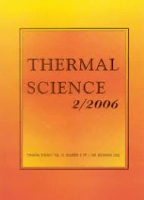
Thermal Science
Exploring the dynamics of thermal science for a greener future.Thermal Science is an esteemed open-access journal published by the Vinca Institute of Nuclear Sciences in Serbia. With a rich focus on the field of thermal science, this journal has established itself as a vital resource for researchers and professionals interested in the dynamics of energy, renewable energy systems, and environmental sustainability. Since its inception in 2001, Thermal Science has dedicated itself to disseminating high-quality research that addresses the challenges of contemporary thermal technologies. The journal has converged its years of publication from 2007 to 2024 and currently holds a Q4 ranking in the category of Renewable Energy, Sustainability, and the Environment, with a Scopus rank of #172 out of 270, placing it in the 36th percentile. This makes it a crucial platform for sharing innovations and findings that contribute to the development of sustainable energy solutions. With open access options available, Thermal Science ensures that knowledge is readily accessible, fostering collaboration and advancement in this critical field.